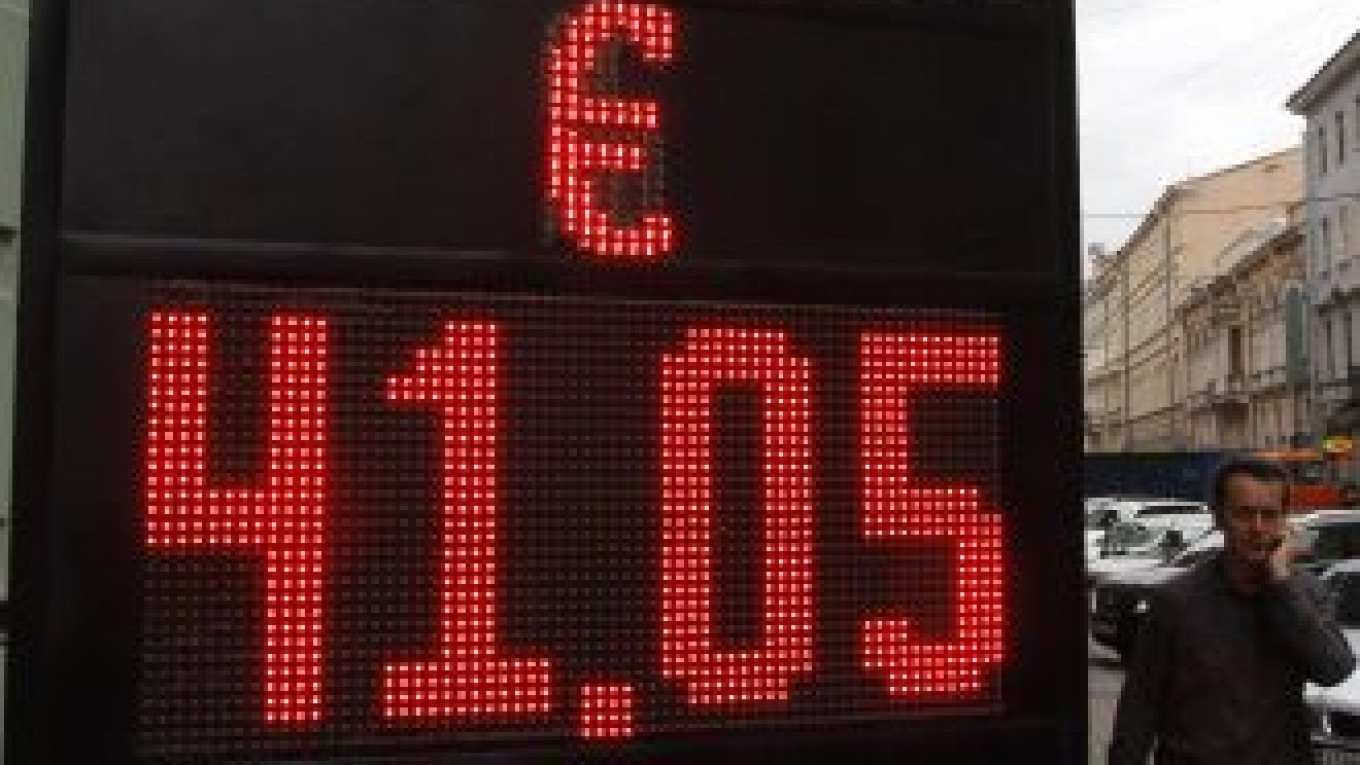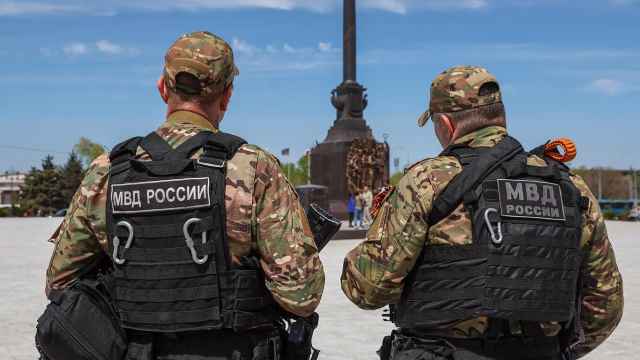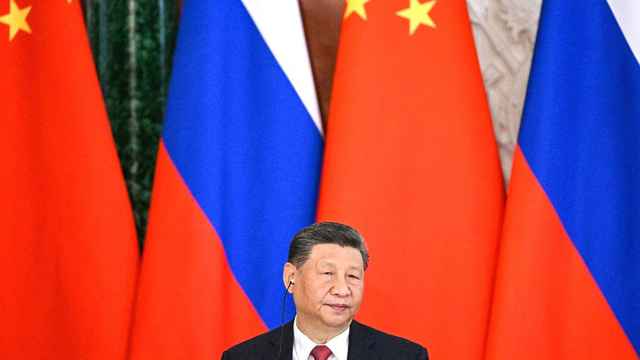Russian stocks followed international markets in a tailspin Monday after a U.S. credit downgrade stoked a huge equity sell-off and talk of a global economic slowdown.
The MICEX plummeted 5.5 percent, its worst drop in more than two years, to close at 1,499.79. The RTS fell 7.8 percent to close at 1657.77, a 22 percent drop from its April high.
The scale of the declines, which began accelerating in the second half of last week on the back of lackluster U.S. growth figures, has prompted comparisons with events leading up to the 2008 economic crisis.
"We're maybe not talking about a repetition of the 2008 scenario, but the memory of it is alive and well," said Pavel Demetchik, a trader with ING Bank in Moscow. "Everybody is very aware that you're better off getting through any crisis with cash rather than some sort of asset which can lose its value in a moment."
The Russian market slump was on a similar scale to that of emerging markets of Brazil, India and China, but the extent of the ruble's fall against the dollar made it stand out.
The ruble fell 2.3 percent against the Central Bank's euro-dollar basket, the most in two years, and was trading at 28.97 rubles to the dollar and 41.15 against the euro at the day's close in Moscow. In contrast, the Chinese yuan was up 0.1 percent against the dollar, while Brazil's real dropped 1.5 percent and India's rupee fell 0.5 percent.
The ruble's decline against the dollar may seem paradoxical in light of Standard & Poor's decision to cut the United States' credit rating a notch to AA+, a move highlighting weakness in the greenback. But analysts explained the development as a flight from risk in a global economy widely considered to be heading toward recession.
"When there's a crisis, people go to the stronger economies and the stronger currencies," said James Cook, founder of private equity fund Aurora Russia. "The U.S. is still considered the lesser of many evils."
Another factor pushing down the ruble was the tumbling price of oil. Despite unrest in the Middle East and emerging market demand, WTI crude fell as much as 5 percent in New York in early trading Monday, sinking to $82.98 after a high of $114.80 on May 2.
If the price of oil continues to fall on the basis that a recession could slash demand in developed economies, there is an expectation that the ruble will also continue dropping.
On Monday, "the ruble acted much worse than most other currencies … and it hasn't reached the bottom," trader Demetchik said. "It could go another 1.5 rubles cheaper against the [euro-dollar] basket this week."
Natural resources companies led the charge on Moscow's bourses, with Rosneft down 5.5 percent, the most in more than a year, oil pipeline monopoly Transneft down 8.8 percent, and coal miner Raspadskaya down 12.1 percent. Rostelecom tumbled 17.9 percent, and Sberbank dropped 6.5 percent.
Miners and metals also suffered in London and New York. The FTSE 100 was down 3.39 percent at the close of trading, while Frankfurt's Dax lost more than 5 percent.
Banks, though, were hit less hard than in previous days as the European Central Bank staged an unprecedented intervention on the debt markets Monday morning, buying up Spanish and Italian debt.
Credit Rating Complaint
While the MICEX and RTS nose-dived Monday, the Finance Ministry released a report asserting that Russia was underrated by credit rating agencies.
"Low rates of state debt ensure Russia's stands out significantly from a large majority of developed countries and emerging markets," the report read.
Though the 48-page report added that Russia might be forced to triple its debt holdings by 2014 by raising about 2 trillion rubles ($69 billion) annually to cover the budget deficit, it argued that its debt-to-GDP ratio of 9.3 percent warranted a more positive recognition from credit rating agencies.
S&P, the credit rating agency that downgraded the United States on Saturday, has placed Russia at the BBB investment grade level, one notch from the lowest possible. Prime Minister Vladimir Putin said last month that the country's credit rating was an "outrage."
Fellow BRIC member India was upgraded by investment bank Goldman Sachs on Monday, offsetting early morning losses on local stock exchanges.
Charles Robertson, chief global economist at Renaissance Capital, said that in the event of a recession, he would advise investors to look to emerging market government bonds, particularly in "liquid, low debt economies."
But, he added, "when the markets are plunging, there are no safe havens."
More to Come
There were sharp falls in early trading on U.S. markets Monday, and the trends of recent days are unlikely to be immediately reversed.
Cook, at Aurora Russia, said market volatility should dampen in the coming days as "panic selling" falls off, the positions of institutional investors become clear and governments around the world start taking positive action.
In the case of another crisis emerging and sustained falls in the oil price, however, Russia is likely to suffer more than other emerging markets.
"If you look at the 2009 crisis, you see that Russia slumped considerably more significantly than other countries," said Natalya Volchkova, macro-economic professor at the New Economic School.
A Message from The Moscow Times:
Dear readers,
We are facing unprecedented challenges. Russia's Prosecutor General's Office has designated The Moscow Times as an "undesirable" organization, criminalizing our work and putting our staff at risk of prosecution. This follows our earlier unjust labeling as a "foreign agent."
These actions are direct attempts to silence independent journalism in Russia. The authorities claim our work "discredits the decisions of the Russian leadership." We see things differently: we strive to provide accurate, unbiased reporting on Russia.
We, the journalists of The Moscow Times, refuse to be silenced. But to continue our work, we need your help.
Your support, no matter how small, makes a world of difference. If you can, please support us monthly starting from just $2. It's quick to set up, and every contribution makes a significant impact.
By supporting The Moscow Times, you're defending open, independent journalism in the face of repression. Thank you for standing with us.
Remind me later.







